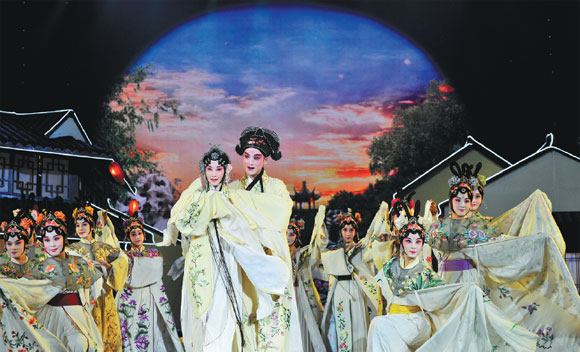Purse Strings
Updated: 2014-09-18 08:36
By Han Bingbin(China Daily USA)
|
||||||||
To spend or not to spend? China's leading TV channels grapple with the dilemma as the planning for Spring Festival galas draws close. Han Bingbin reports.
China Central Television has yet to announce the details of next year's Spring Festival gala, which is among the country's most anticipated annual events. The channel was expected to name a director for its cultural extravaganza in August, but that has been deferred without an explanation, leading some fans to believe that the gala could be scrapped.
Although CCTV has said that it will try to make "a better show" this year, to be broadcast in early 2015, there's a feeling in the TV viewing community that the channel, known for its financial muscle, might be struggling with planning the event on a modest budget, and hence the scheduling delay.
In the past few years, Chinese TV stations have made it a tradition to host galas during important festivals, with top-notch artists participating in them in the grandest of ways. But the splurge of public money on shows has come under central government scrutiny.
In 2013, the Publicity Department of the Communist Party of China Central Committee discouraged government officials from spending funds on lavish celebrations and paying exorbitant fees to celebrities for their appearances.
The industry regulator, the State Administration of Press, Publication, Radio, Film and Television, also issued a notice last year urging frugal production of such galas, with a greater emphasis on content.
China News Service recently quoted an anonymous CCTV source as saying that the delay in announcing the schedule for the Spring Festival gala also had something to do with "playing down its scale".
Famous film director Zhang Yimou was rumored to be appointed as the show's main director this year, but now that looks unlikely. Although high-profile filmmaker Feng Xiaogang was the gala's chief director last year, CCTV had toned down the visual presentation by replacing fancier stage settings with rented LED screens, among other measures.
Provincial satellite channels made some compromises as well.
Leading broadcaster Hunan TV, for instance, has reduced the number of its gala shows surrounding events such as Chinese Valentine's Day to around three per year. The channel didn't have anything special for last year's Mid-Autumn Festival, which - apart from the Spring Festival - drives annual advertisement revenues for TV stations.
Hunan's much hyped comeback during this year's Mid-Autumn Festival carnival, however, wasn't greeted as well by fans owing to the subpar lineup of stars, consisting mainly of pop singers popularized by reality TV shows, and routine stage settings.
The CCTV Mid-Autumn Festival gala also kept a low profile in terms of lighting designs and the choice of artists. The gala was filmed in Suzhou in eastern China, and, according to local media reports, many of the celebrities attending it opted for high-speed trains rather than flights due to the channel's limited budget.
"The regulations are not necessarily intended to cap the budget of a single gala, but rather to control the total number of such shows," says Cheng Xiaofei, a renowned TV critic and independent producer who earlier worked with Hunan TV.
In the past few years, gala shows have become a segment where competition between satellite channels has intensified. Initially, Hunan TV led the production of year-end gala shows. But soon enough other channels, such as Jiangsu TV, began to challenge its dominance over the televised events.
"Year-end shows sort of become a manifestation of the TV channels' overall production level, a way for them to market themselves and increase influence," says Cheng.
To create a better impression to advertisers and viewers, channels usually end up paying a lot of money to get A-listed celebrities.
"The money mostly goes to celebrities, with little left for the creative staff members, such as directors and scriptwriters. It's like the cooking materials are too expensive while the really important chefs are earning very little," media researcher Leng Song told China Daily in an earlier interview. Leng works for the major think tank the Chinese Academy of Social Sciences.
Star power alone can prove brutally unsustainable, says Cheng.
Fans may easily switch the channel after watching their favorite stars or may get bored of the too-frequent appearances of some people.
The government austerity drive has influenced decisions by channels.
Chinese TV stations used to be solely State-owned and rely on government subsidies. But in the past decade many leading channels have learned to play the markets, with influential programs bringing in considerable incomes. That's to say, Cheng says, many are spending their own money.
"To produce extravagant gala shows is part of their development strategy. It should be encouraged in a way," he says.
The effects should be left for the market to test and tell.
He was told by an official from Jiangsu TV last year that the channel had plans to halt its year-end shows because of their unsatisfactory performance, Cheng says. "If a program doesn't end well, the TV station will drop it anyway."
Contact the writer at hanbingbin@chinadaily.com.cn
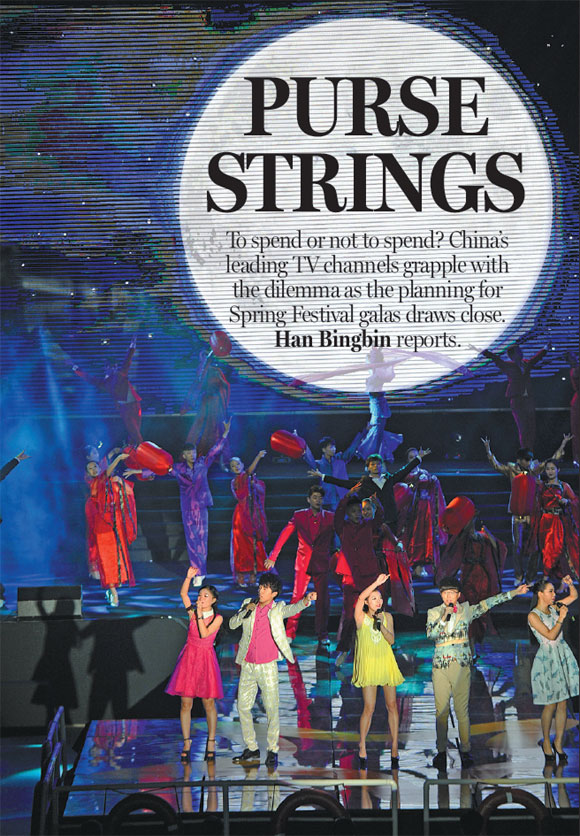
|
This year's CCTV Mid-Autumn Festival gala, filmed in Suzhou, Jiangsu province, kept a low profile in terms of lighting designs and the choice of artists. Photos Provided to China Daily |
(China Daily USA 09/18/2014 page9)
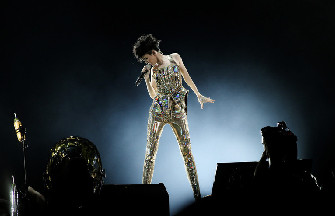
 Star Stefanie Sun holds concert in Beijing
Star Stefanie Sun holds concert in Beijing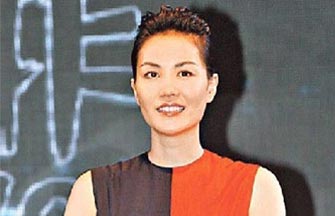
 Faye Wong's manager refutes star's drug rumors
Faye Wong's manager refutes star's drug rumors
 Lu Yi and daughter Bei Er pose for street snaps
Lu Yi and daughter Bei Er pose for street snaps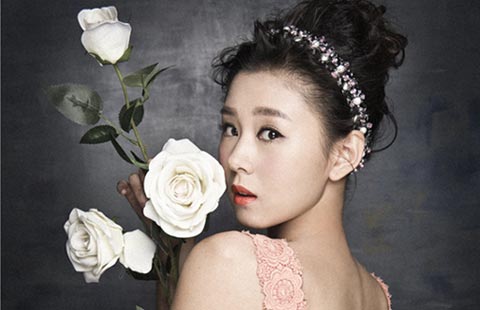
 Photoshoots of actress Li Xiaomeng
Photoshoots of actress Li Xiaomeng
 Council of Fashion Designers of America Awards
Council of Fashion Designers of America Awards
 Fan Bingbing, first Chinese actress in Barbie Hall of Fame
Fan Bingbing, first Chinese actress in Barbie Hall of Fame
 Awarding ceremony of 2014 hito Pop Music held in Taipei
Awarding ceremony of 2014 hito Pop Music held in Taipei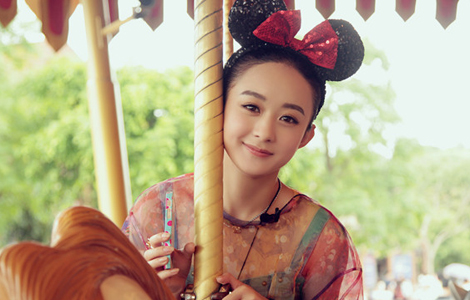
 Zhao Liying's photo shoot for Children's Day
Zhao Liying's photo shoot for Children's Day
Most Viewed
Editor's Picks

|

|

|

|

|

|
Today's Top News
Alibaba jumps more than 40% in trading debut
Alibaba shares surge 46% in their debut
Alibaba to rise more than 30% in trading debut
Alibaba expected to open at $80-$83 in debut
Alibaba makes its mark on Wall Street
China's e-commerce giant Alibaba debuts at NYSE
Carbon issue consensus is expected at UN
Off-limit investment list should get shorter, premier says
US Weekly

|

|
